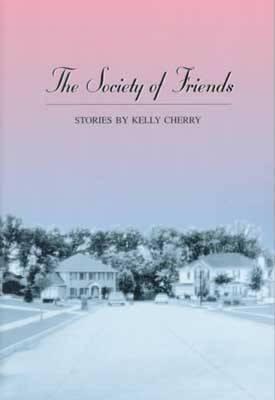Imagine, if you will, a residential street in Madison, Wisconsin, where every neighbor is a member of the university faculty. Is this a metaphor for Hell? A trip to the Twilight Zone? A sequel to Richard Russo’s tenure-track satire, Straight Man, or Jane Smiley’s Moo?
None of the above. The Society of Friends is a collection of related stories about decent, earnest, overeducated residents of the heartland. Their lives braid and separate in ordinary ways, and a less scrupulous writer would have gone for the cheap laugh and made fun of the characters’ sad humanity. Instead, Kelly Cherry offers a smorgasbord of Midwestern kindness, clumsiness, and salvation. “That’s what we need a God for,” her main character, Nina Bryant, says: “to grant forgiveness where the rest of us can’t quite manage it.”
The neighbors of Joss Court, their children, parents, lovers, and ex-spouses, dead and alive, are our neighbors. They declare bankruptcy, deal with a grown child’s homosexuality, grieve for real and imagined losses. They hold block parties, attend readings by visiting writers, rake their yards, and occasionally engage in government-subsidized “performance art,” portraying “The Gaza Strip Tease,” “The Martin Luther Kingston Trio,” “Cybersuck, or Vampires with Laptops,” and “The Three Faces of Evil: Hussein, Gorbachev, Bush.” They bolt their doors at night against an undefined, suspected lurking danger.
Both the author and her character Nina Bryant are “Famous Writers” and English professors at the University of Wisconsin- Madison. This is unfortunate: It might derail readers who actually care about such inessentials. Wise ones, however, won’t let it get in their way because, whether the book is autobiographical or not, its great fun lies in Cherry’s fond, unflinching eye and perfect verbal pitch.
This is Cherry’s sixth full-length book of fiction, but the first for me, although I’ve long admired her poems. She’s smart, daring, rueful, funny. Even better, like any good poet, she reconstructs the chaotic deconstructed universe with startling, dead-on metaphors. Her story telling action is capable—she gets us from point A to point B—but she’s at her very best when she hovers over some observation, laving the language on with a trowel. Take this wry, tender description of a man Nina loves:
Like most academics, he was deracinated, a man for all locales. Pittsburgh, Charlottesville, Palo Alto had been some of the points on his trajectory, but weren’t they all the same, intellectually homogenous no matter how ethnically diverse, one big reading list? He had the pampered academic’s exuberant desire to see the world benefit from his thinking. He was generous and ignorant, a middle-aged man in a preserve for middle-aged males, a place where middle-aged males grazed on grants or snoozed the afternoon away in endowed chairs, a place where they had a kind of mental sex in institutes (Esalens for the mind, these “Institutes for Research”) and grew fat on footnotes—perpetrated by friends in other preserves—and cited the few articles they’d written.
We all know that man; Kelly Cherry likes him.
There’s humor and—perhaps even rarer these days—good humor throughout these stories. The book’s comedic and philosophical zenith is the chapter immortalizing Nina’s forever-unnamed “little dog,” her “Cairn-bairn.” Never did I dream that a dog expressing its anal sacs by “scooting” (precise veterinary term) across the carpet could make me howl in an airport—or that such a time-honored canine urge might make a grand metaphor. “There is an itch so private that most people will discuss it only with their doctor,” Nina says. “Seems to me [writers are] all expressing our anal sacs, too.” God help us, she’s right.
It would be easy to create a bleak still-life with these characters, but Cherry doesn’t. She is involved with them, kind to them, and they are kind to each other in their inept human way. These people thrive by their stubborn involvement with each other. They came together from all corners of the country and have formed a family, sharing parenting tips and divorces and beer from coolers.
Nina’s dog once ate all of her earrings, and the vet told her to take him for a walk and “see what comes out.” They all came out. She washed them, her father sterilized them, and although she could never bring herself to wear them again, she could also never throw them away: They were a reminder of her involvement in loving her “little dog,” now aging, and her father, now dead. “I think, sometimes, about the survivalist,” Nina says. “I think we survive, if we survive, not by taking to the hills and feeding on whats there, unprocessed, but by being processed. Something swallows us and we make a long, dark journey at the end—the end!—of which we are still here, shiny and scintillating, bright as treasure, diamonds in the roughage.”
[The Society of Friends, by Kelly Cherry (Columbia: University of Missouri Press) 192 pp., $17.95]

Leave a Reply